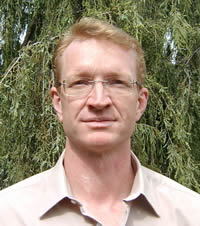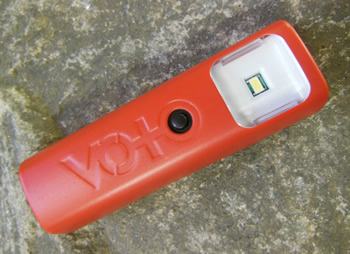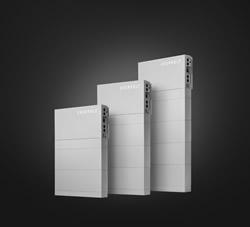One half of the VOTO is a fuel cell and the second half is a handle which has a light, cell phone adapter and nickel-metal hydride battery to store energy.
VOTO - Charging Batteries in a Fire
Craig Jacobson | Point Source Power
Can you tell us what VOTO is and what it does?
 It's a portable cell phone charger and light that itself can be charged by placing into a cook stove. One half of the VOTO is a fuel cell and the second half is a handle which has a light, cell phone adapter and nickel-metal hydride battery to store energy. In the case of VOTO – which is initially focused on Kenya and other developing countries – it's used with a jiko stove (a charcoal cook stove), which is found throughout Eastern Africa. Many people use a jiko stove in Kenya, so we designed it for that particular application.
It's a portable cell phone charger and light that itself can be charged by placing into a cook stove. One half of the VOTO is a fuel cell and the second half is a handle which has a light, cell phone adapter and nickel-metal hydride battery to store energy. In the case of VOTO – which is initially focused on Kenya and other developing countries – it's used with a jiko stove (a charcoal cook stove), which is found throughout Eastern Africa. Many people use a jiko stove in Kenya, so we designed it for that particular application.
How did the original idea for VOTO come about?
When I was leaving the Lawrence Berkeley Lab [after 13 years] to start Point Source Power, I wanted to take the fuel-cell technology I developed there and use it to make a difference in the world. So I looked around and found an application and a need that really matched the level of technology. You can spend years developing a big system, or you can get small products, and develop the design and technology for a particular application. What we chose was an off-grid application for developing countries where they need lighting and cell phone charging.
What were some of the major design and development challenges VOTO faced in becoming a reality?
Getting the technology we needed in a small, low-cost package. We also wanted to make it really easy to use and intuitive so instructions were not needed; we want people to pick it up and just understand how to use it, which was important to us.
 |
 |
How much does it cost?
We want it to be affordable, so we’re targeting a $17 retail price in Kenya.
How long does it take to charge?
It takes one to two hours to charge the VOTO itself. Once those batteries are charged, you can run the light for approximately 35 hours, and it will put 600 milliamp-hours into a cell phone (about an eight-hour charge), which is enough for the smaller cell phones in Kenya.
How did Proto Labs’ prototyping and manufacturing solutions help VOTO?
The challenge as a small company was moving from basic 3D printing and in-house-made prototypes to something that can be mass manufactured, and that’s where Proto Labs came in. We were able to do a 3D-printed version, which looked fine; it was not a finished part, but it was good enough for some testing. It’s then taking that next step with Proto Labs where we have something that can be tooled up and ready for increased production.
What is the Cool Idea! Award, and how has it helped VOTO reach its production goals?
It’s an award granted by Proto Labs that provides a yearly aggregate of $250,000 in injection molding and CNC machining services to entrepreneurs developing new products in the United States and Europe; it’s meant to help turn innovative ideas into real products. Through the Cool Idea! Award, Proto Labs injection molded 500 complete plastic VOTO handles, which included the baseplate, body, end cap and window.
Can the technology used in VOTO be scaled up to provide power for more demanding applications?
Yes. The metal-supported solid oxide fuel cell technology we developed can be scaled up very well. We’re doing small systems because that’s where we think fuel cells make a lot of sense in early markets, but it can be scaled up to kilowatts or hundreds of kilowatts if you want.
What’s next for VOTO? Can we expect to see this technology expanding to more countries in the near future?
We’d like to do a version for the recreational camping market in the United States, which would be our next development project. We’d like to get something out by the spring, but it’s dependent on resources.
Craig Jacobson, Co-Founder, CEO Point Source Power.
Craig is responsible for product development, operations, and investor relations at PSP. Before founding PSP he spent 13 years at Lawrence Berkeley National Laboratory where he worked on fuel cells, gas separation, high temperature materials and processing. His expertise is creating technical innovation via synthesis of disparate literature, field research, and market opportunity information and has over 20 issued US patents and more than 150 pending worldwide. Awards include the LBNL Technology Transfer Award; LAUNCH Energy Innovator; R&D100 Award; and Proto Labs Cool Idea Award.
The content & opinions in this article are the author’s and do not necessarily represent the views of AltEnergyMag
Comments (0)
This post does not have any comments. Be the first to leave a comment below.
Featured Product

